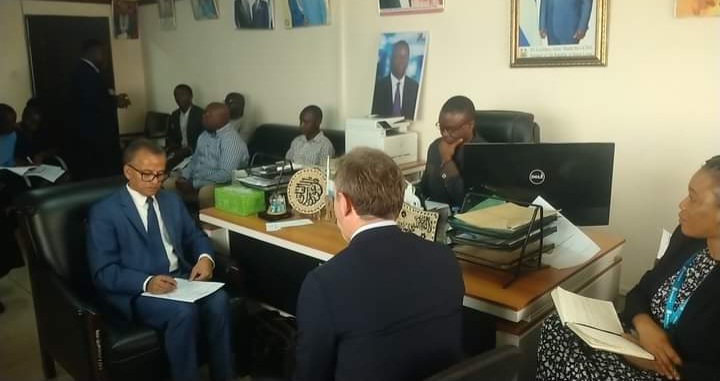Representatives of the World Bank have on Monday 6 February 2023 paid a courtesy call on the Minister of Environment and Climate Change, Prof. Foday M. Jaward.
The mission objective of the visit was to present overall structure and objectives of the Country Climate and Development Report (CCDR) and discuss specific objectives and priorities of Sierra Leone CCDR, identify potential method and approaches to access and collect data and information to prepare CCDR, and to discuss key priority sectors for climate action and development.
Welcoming the team, the Minister of Environment and Climate Change, Prof. Foday M. Jaward said the Ministry of Environment was given additional portfolio “Climate Change” last November, 2022, since it was established as a stand-alone Ministry by H.E President Maada Bio in 2019.
He said lots of achievements has been made by the Ministry to strengthen climate change resilient and to protect the environment.
He disclosed that Sierra Leone is contributing less green house gas emissions into the atmosphere as evident in the inventory carried out by EPA-SL on greenhouse gas emission released into the air.
Consequently, he noted that the country is feeling the brunt of climate impact. Sequel to this, he intimated that environmental issues required collective approach to ensure sustainable protection of the environment and to strengthen climate change resilient.
He affirmed that there are three critical areas required to enhance climate change resilient notably deforestation, solid waste management and environmental education. He said that the Ministry has successfully revised six legislations that have been enacted by Parliament to ensure the environment becomes safe for everyone.
He confirmed that the plastic policy for Sierra Leone has been developed with support from World Bank, and furthered that government is committed to enact it. He assured the WB team of government’s commitment and disclosed that for the first time Sierra Leone is set to have a storage facility to store nuclear waste materials.
He emphasized that government needs funding and other support to help improve on its climate resilient programs.
The Team Lead from World Bank, Sanjay Srivastava, said World Bank is one of the largest partners that provides concessional loans, and as well provides technical assistance to advice on extreme poverty issues. He confirmed that to understand the gap on climate issues in Sierra Leone, is to use their expertise to meet government vision and demands on climate issues.
He explained that for the past few years WB has reemphasized the importance of keeping the planet safe, noting that real patterns are increasingly changing that are contributing to climate impact.
He said the importance of development is key to keep the planet safe, adding that investment on agriculture, water resources, environment and energy are essential for climate change development.
He noted that WB considered human capital development relevant for sustainable socio-economic development of the people of Sierra Leone through job creation and education.
He said WB has a third pillar known as the climate inform pillar which served as an important contributor for Africa countries that need to know how to manage their economic, national and human capital. He said Africa contribution to climate change is less than 4% with Sierra Leone contributing less than 0.2% but is mostly affected due to poor resilient infrastructure.
He disclosed that how to make citizens resilient to climate change is the key intervention of Country Climate and Development Report (CCDR) through stakeholder engagement to understand the linkage between various sectors on the economy and the impact of climate on the economy. He affirmed that once these gabs are understood WB would be able to come up with a set of priorities on investments, enhancing resilient infrastructure and human capital, and more resilient development policies and regulations. He affirmed that these are the tools WB is using to inform which priority areas it should be investing on within the next three years.
He pinpointed that the government of Sierra Leone needs to prioritize more on economic values that are related to investment on waste management that would make people safe from climate induce disaster. He emphasized that since WB has identified Sierra Leone as one of the potential beneficiaries in Africa under the CCDR analysis, the government needs to have solid evidence and scientific analysis on priority areas that are vital for WB intervention. In addition, he noted that WB could informed government partners on the various roadmaps to help meet the commitments on the Nationally Determined Contributions (NDC).
He maintained that another crucial area for CCDR is forest conservation which is critical for climate economy. He said this area is crucial for protection of endangered species that are prone to extinction. In addition, he mentioned climate financing as a critical area to support mitigation and adaptation actions that will address climate change.
Meanwhile, a power point presentation was done on CCDR discussions that required key responds from the Ministry and its supervising Agencies notably, Environment Protection Agency EPA-SL, Sierra Leone Meteorological Agency SLMet, National Protected Area Authority and Conservation Trust Fund CTF, Nuclear Safety and Radiation Protection Authority, and Forestry Division.


 Post a comment
Post a comment









Comment(s)
Disclaimer: Comments expressed here do not reflect the opinions of Sierraloaded or any employee thereof.
Be the first to comment